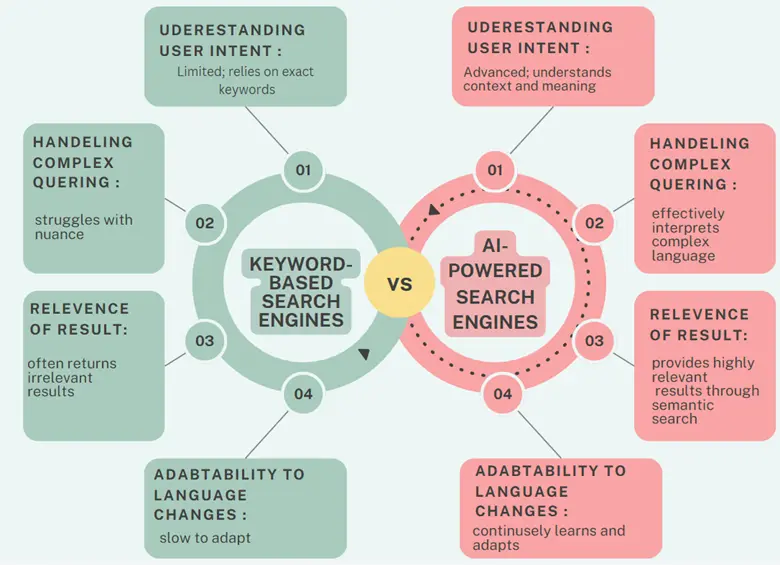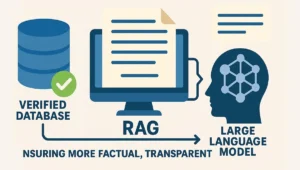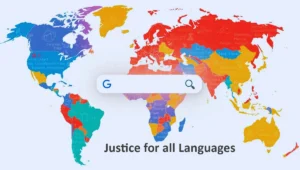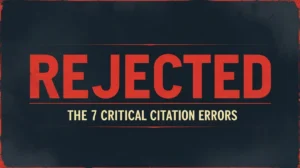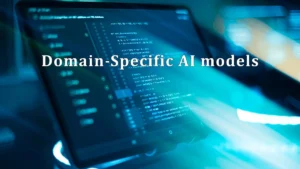Envision a scenario where libraries are no longer merely storage spaces for reference materials but active places for exploration. This paper discusses the revolutionization of the accessibility and usage of library resources by individuals using interactive AI-powered search.
After looking into the drawbacks of traditional keyword-based search engines, explaining the benefits of a semantic search, and then the author to interactive search engines for specific libraries throughout the paper will offer clinical reasoning to the new technology. Finally, it will touch on the specific information about training an interactive search engine.
Table of Contents
Problems with Keyword-Based Search Engines:
Keyword-based search engines, especially in specialized libraries e.g. academic or medical collections tend to have several main issues preventing their successful execution:
To begin with, these search engines fail to appreciate the user’s purpose in performing a search and thus a lot of relevant information is returned mixed with a lot of garbage as a result of confusion in the meaning of the word or the phrase or even the search in general. To illustrate this, if a user would like to know what RDA means, the search results for the inquiry may be very diverse and unrelated because the question asked as a whole is not comprehended but rather the machine only analyzes the term “RDA”.
Very often it is impossible to get the correct results using traditional search engines even if very complex search query parameters are synthesized. The reason lies in knowing too little of the subject to make everything work exquisitely.
Another complicating factor is excessive information seeking behavior due to users’ content blindness – not being able to locate any specific information because of sifting through piles of unnecessary information or finding alternative matching content. Moreover, back end search engines cannot perform searching for corresponding keywords and therefore the search results do not meet expectations. Having said that it is not difficult to imagine many other sources of information like that persons in extensive indexing libraries found it problematic in limiting abuse of outright search engine manipulation.
Similarly, these create a dilemma of a lot of information in search of which the users make several futile attempts to clear out some of the content. This is a long and annoying task. Another point of adjustment is the changing dynamics of language where many search engines lag behind any new words that are introduced or even regional differences in the language.
From a technical standpoint, bearing a huge database of indexes and ensuring the freshness of these databases is cost and time prohibitive and presents practicality challenges. Nontext content such as videos and pictures has its complications with traditional search engines where a lot of relevant information produced depends on how accurate the captions are.
In specialized libraries, usage of keyword based systems fails due to the specificity that comes with the high level terminology. Most of the search engines greatly depend on the quality of metadata which is mostly assigned manually and not only subjective but also age out with time. This challenge is made worse by the inability to retrieve related materials on the same subject by even basic keyword searches. In comparison, advanced and expensive – AI driven – semantic search engines would solve most of these issues thanks to the ability to comprehend the meaning and scope of relationships in data.
Features and Core of AI-Powered Interactive Search Engines:
AI-powered interactive search engines harnessing AI technologies provide several disruptive capabilities that optimize the search process considerably.
At its heart, the engine uses Semantic Search (SS) which chips in to provide its meaning when a user makes any input unlike when only keywords are used. This helps in the cases where there is an ambiguity on some terms that would otherwise return non-useful information to users. There is also Natural Language Processing (NLP) which enables the system to understand even sophisticated and complicated phrases, thereby allowing users to speak what information needs they have in simple and clear language.
The addition of a Knowledge Graph (KG) is essential as it provides a way to visualize and contextualize the interaction between different entities which improves the search depth and enables the users to look out for many related queries search wise. Also, with the incorporation of Machine Learning (ML) in the search engine, the search mechanism learns from users’ actions and search results embellishing with time to give more precise search results.
Moreover, Semantic Recommendations (SR) together with Natural Language Programming (NLP) and Machine Learning (ML) allow for predicting and serving the relevant content to the users depending on their previous search activities and the current query in context. This is added with other interactive components such as changeable parameters (facets) that allow users to narrow down their results by any number of characteristics, and typing anticipations which help users when typing.
The next generation also embraces dialogue systems allowing conversational searching where the user enters almost every search keyword in the form of a conversation. The system is also capable of voice and multimedia natural language search to accommodate different users and types of information. All these combined give the special libraries slender interactive search engine the virtue of enabling users to retrieve information fast and efficiently.
How AI-Powered Interactive Search Engine Can Solve Problems:
Interactive AI-powered search engines that use AI technology provide solutions to the problems posed by keyword searches in specialized libraries due to semantic search technologies.
One of the problems is the presence of field-specific vocabulary and complex information needs. Semantic search solves this by going beyond word searching, as words do not carry meaning in isolation but in relation to the entire context. For example, a legal scholar may use the term “contractual liability” in his search but may also be served with content on “breach of contract” and “tort”.
Another example is the excessive dependence on metadata content. While semantic search performs the same operations as textual analysis, the content within the documents themselves is assessed, thus lowering the need for metadata which may not fully accurately reflect the issue. This is especially helpful for improving the search results when there is little or no metadata present.
Moreover, semantic search enables the users to overcome the problem of difficulty in tracing out the relevant materials since it is capable of tracing concepts and the relationships between the terms. This makes it possible for the engine to recommend certain materials that would be difficult to find and usually impossible to pinpoint by keyword searching, hence making the research process better.
Conclusion
The potential of engaging in research with the capabilities of interactive web-based AI-powered search engines is very captivating, especially in specialized libraries. Compared with the bandwidth-limited approach of the traditional keyword-based search engines, cognitive type systems like semantic search engines are easier, more relevant, and more effective in performance.
Although there are still concerns for example the need for correct information and the resources to employ it, the chances of enhanced discovery, enhanced relevance and improved search experience make AI a very critical component for the prospects of such libraries.
References:
- Enterprise Knowledge (2021-11-10). “Expert Analysis: Keyword Search vs Semantic Search – Part One.”
https://enterprise-knowledge.com/expert-analysis-keyword-search-vs-semantic-search-part-one - Monetate (2022-06-25). “Semantic Search Explained.”https://monetate.com/resources/semantic-search-explained
- Glean (2022-05-04). “Semantic Search & Productivity.“https://www.glean.com/blog/semantic-search-productivity
- Jäschke, Robert, & Hotho, Andreas (2011-05-23). “Resource Retrieval in Semantic Search Engines.” In Proceedings of the 11th International Conference on Knowledge Management and Data Mining. Springer, Berlin, Heidelberg. https://link.springer.com/chapter/10.1007/978-3-642-20946-8_2

